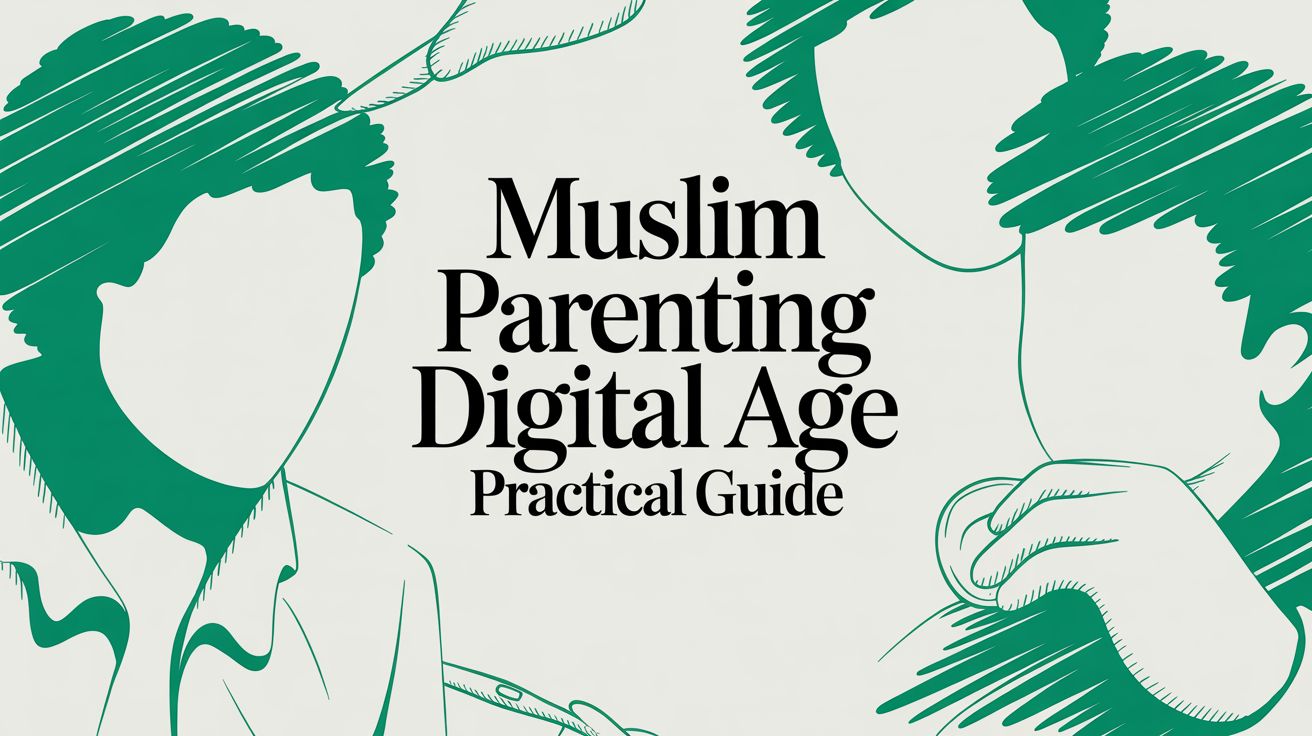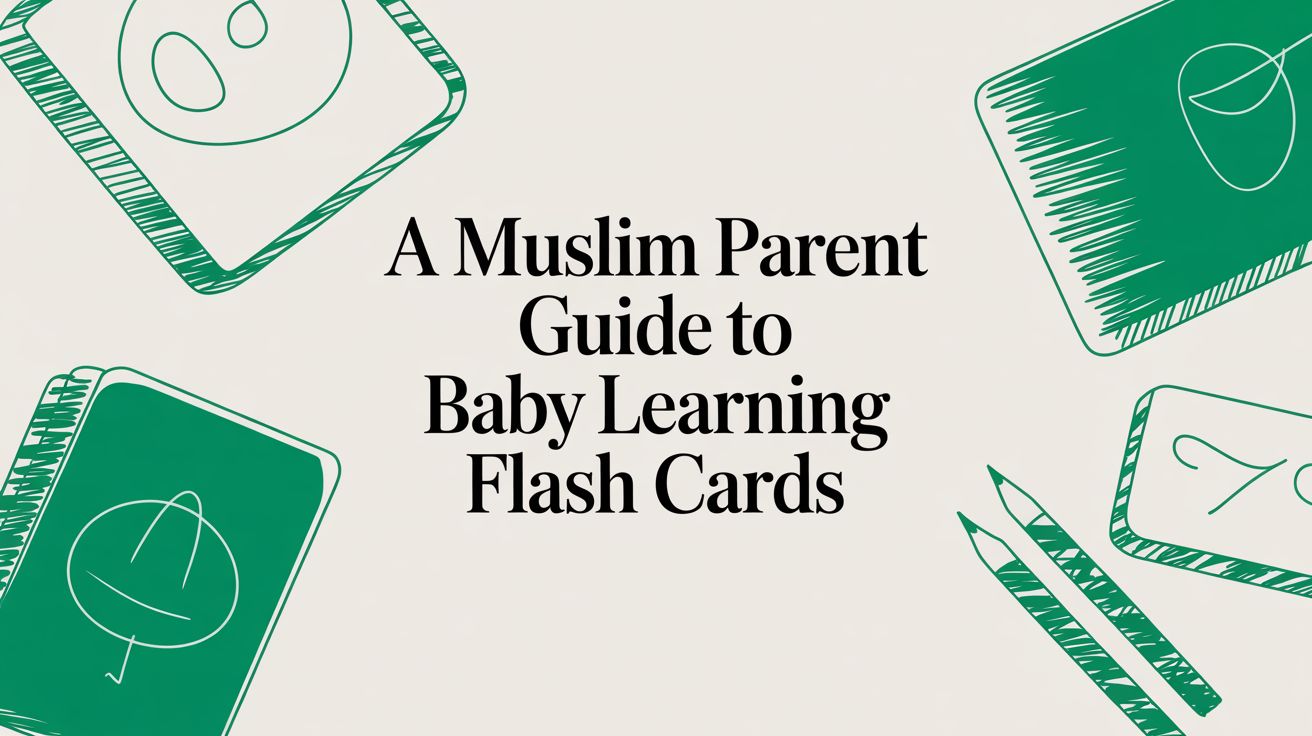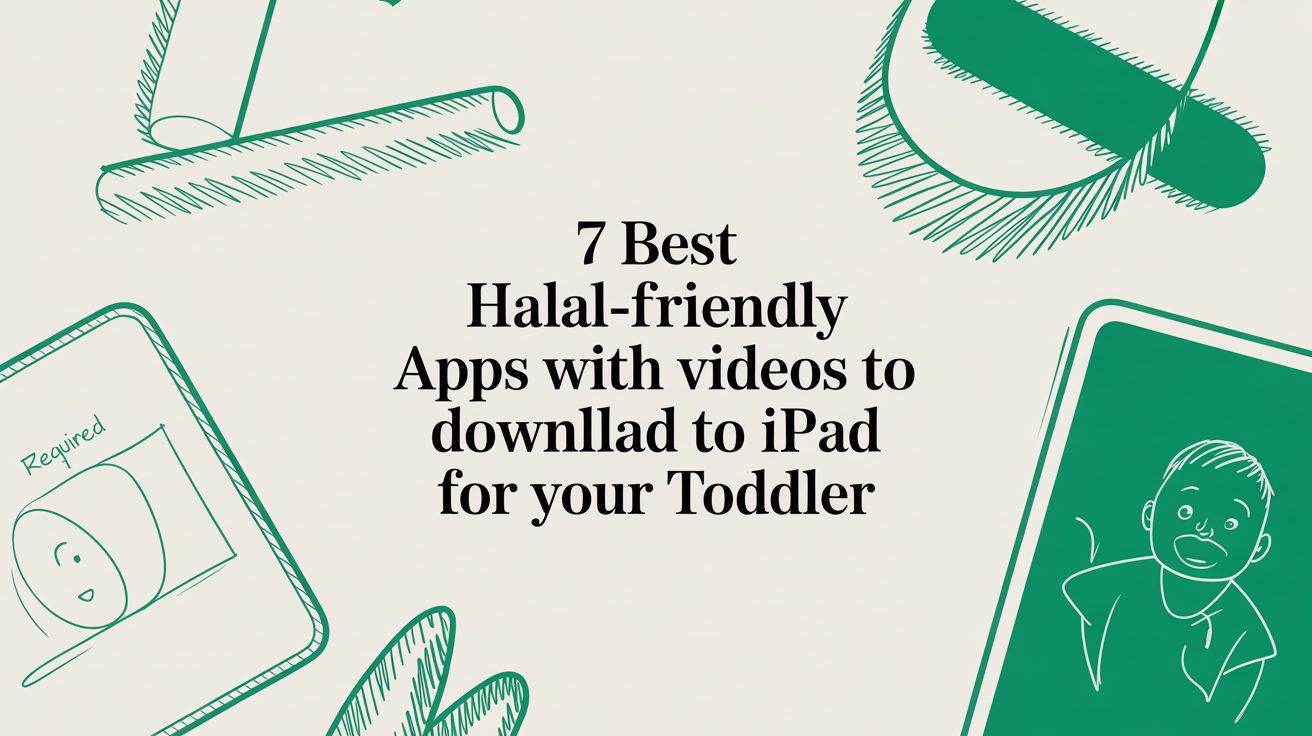As a Muslim parent today, you're navigating a world our own parents could never have imagined. Questions about screens are probably a constant, quiet hum in the back of your mind. How much is too much for a one-year-old? What on earth can they watch while you’re scrambling to get dinner ready before Maghrib?
More than anything, you want to find content that nurtures their pure, God-given nature—their fitra—instead of chipping away at it.
A Faith-Centered Roadmap for Modern Muslim Parents
If you're asking these questions, you're not alone. These are the real, everyday concerns in Muslim homes everywhere. We want to protect our children's innocence and build a strong foundation of Islamic manners (adab), but we also live in a world where screens are simply part of the furniture.
The good news? You don't have to choose between your faith and modern life. It's entirely possible to find a balance that feels right.
Blending Timeless Values with Daily Realities
This guide is meant to be a friend on your journey, one who understands the juggle of prayer times, meal prep, and the beautiful chaos of raising little ones. We're moving past the generic, one-size-fits-all advice to offer practical, faith-aware solutions that actually work in your home.
This isn't about rigid rules or parent-shaming. It's about feeling empowered. When you blend timeless Islamic principles with a real-world understanding of how young children develop, you can create a digital environment that is healthy, intentional, and balanced.
Our goal is to help you transform technology from a source of anxiety into a purposeful tool—one that supports your parenting and helps you raise a child connected to their faith from day one, inshaAllah.
What This Guide Will Cover
We'll walk through a complete framework to help you feel prepared and confident in your choices. Together, we’ll explore:
- Building on Islamic Principles: How core concepts like amanah (trust) and moderation can guide your screen time decisions.
- Practical Screen Time Routines: Creating gentle, age-appropriate boundaries that flow with your family’s rhythm.
- Choosing Halal Content: Learning what to look for in media that is safe, beneficial, and reinforces good character.
- Balancing Screens with Play: Nurturing real-world connection and crucial developmental skills away from the screen.
- Creating a Safe Digital Home: Simple, practical steps to set up your environment to protect your little ones.
Think of this as your roadmap. It's here to help you navigate the challenges with intention, ensuring technology serves your family and strengthens your child’s beautiful Muslim identity.
Building a Foundation on Islamic Principles
Before we get into the nitty-gritty of screen time limits and app recommendations, let's take a step back. As Muslim parents, we have a beautiful and powerful framework to guide us through the challenges of raising kids today. Grounding our digital parenting choices in our faith helps us move from a place of fear and reaction to one of purpose and intention.
Think of it like building a house. You wouldn’t start by picking out paint colors; you’d begin with a solid, unshakeable foundation. For us, that foundation is built on timeless Islamic values that give us clarity and strength.
The Sacred Trust of Amanah
One of the most profound concepts in our faith is amanah, or trust. Allah has entrusted us with our children, placing them in our care for a short time. This responsibility covers everything—their physical, emotional, and spiritual well-being. When we see their digital exposure through this lens, our perspective changes completely.
Suddenly, protecting their digital lives becomes just as vital as making sure they eat healthy food or sleep in a safe cot. It means we are entrusted with safeguarding their innocent eyes and ears from harmful content and their developing minds from being overwhelmed. Every choice we make about a screen is an act of fulfilling this precious amanah.
Practicing Muraqabah in a Digital World
Another key principle is muraqabah—that beautiful, constant awareness that Allah is watching. We often think of this in terms of our own actions, but it's a powerful tool for parenting, too. It pushes us to be mindful and present in our daily habits, not just in our prayers.
So, what does muraqabah look like in a digital context? It means being consciously aware of the media our children are consuming. It's about pausing to ask ourselves:
- Does this content align with the values I want to instill in my child?
- Is this video, app, or game genuinely beneficial for their development?
- Am I modeling a healthy, mindful relationship with my own devices?
This internal checkpoint helps us make decisions that are not just convenient in the moment—like when you desperately need five minutes to pray Dhuhr without a toddler climbing on you—but are also spiritually sound and deliberate.
This mindset transforms us from passive observers into active, thoughtful curators of our children's digital world. We're ensuring that what they absorb is wholesome and nurturing for their fitra (natural disposition).
The Wisdom of Wasatiyyah (Moderation)
Islam is a faith of balance. The principle of wasatiyyah, or moderation, is a cornerstone of a healthy life and the perfect antidote to the extremes of the modern world. Technology, with its endless stream of content, can easily lead to excess. For a baby or toddler, this can show up as overstimulation, disrupted sleep, and trouble focusing on real-world play.
Applying wasatiyyah to screen time isn't about total restriction or unlimited access. It’s about finding a healthy middle path that works for your family. It's about recognizing that technology can be a useful tool but should never take over a child’s world.
This balance ensures that screens supplement, rather than replace, the things that truly matter for a child's development: human connection, physical play, and exploring Allah’s creation with their own five senses. By embracing these principles, we build a resilient framework that makes our parenting choices not just practical, but blessed with purpose and intention.
Practical Screen Time Strategies for Young Children
Let's be honest. Managing screen time with a baby or toddler can feel like a constant battle, especially when you're just trying to get dinner on the table before Maghrib or simply catch your breath. The goal isn't to eliminate screens entirely—that's often unrealistic. It's about shifting our mindset from guilt and restriction to one of intention and balance.
First, it’s helpful to remember that not all "screen time" is created equal. A video call with Jaddah and Jaddoh who live across the country is a world away from a flashy, overstimulating cartoon. A sweet, gentle nasheed about the Arabic alphabet serves a completely different purpose than a passive video. Recognizing this difference is the first step toward making conscious, confident choices for your little one.
Creating a Simple and Flexible Digital Routine
Young children thrive on predictability. It makes them feel safe and secure. Just as you have routines for naps and meals, weaving in a simple, gentle "digital routine" can help manage expectations and, insha'Allah, prevent some of those dreaded tantrums. This isn't about a rigid, minute-by-minute schedule, but a predictable rhythm that fits into the flow of your family's day.
Think of it as anchoring screen use to other parts of your day, like prayer times or meals. For example, maybe your toddler gets to watch a short educational program while you prep dinner after the Asr prayer. This kind of consistency helps your child learn when screens are available and, just as importantly, when they are put away.
These three core Islamic principles are the perfect foundation for guiding your digital parenting journey.
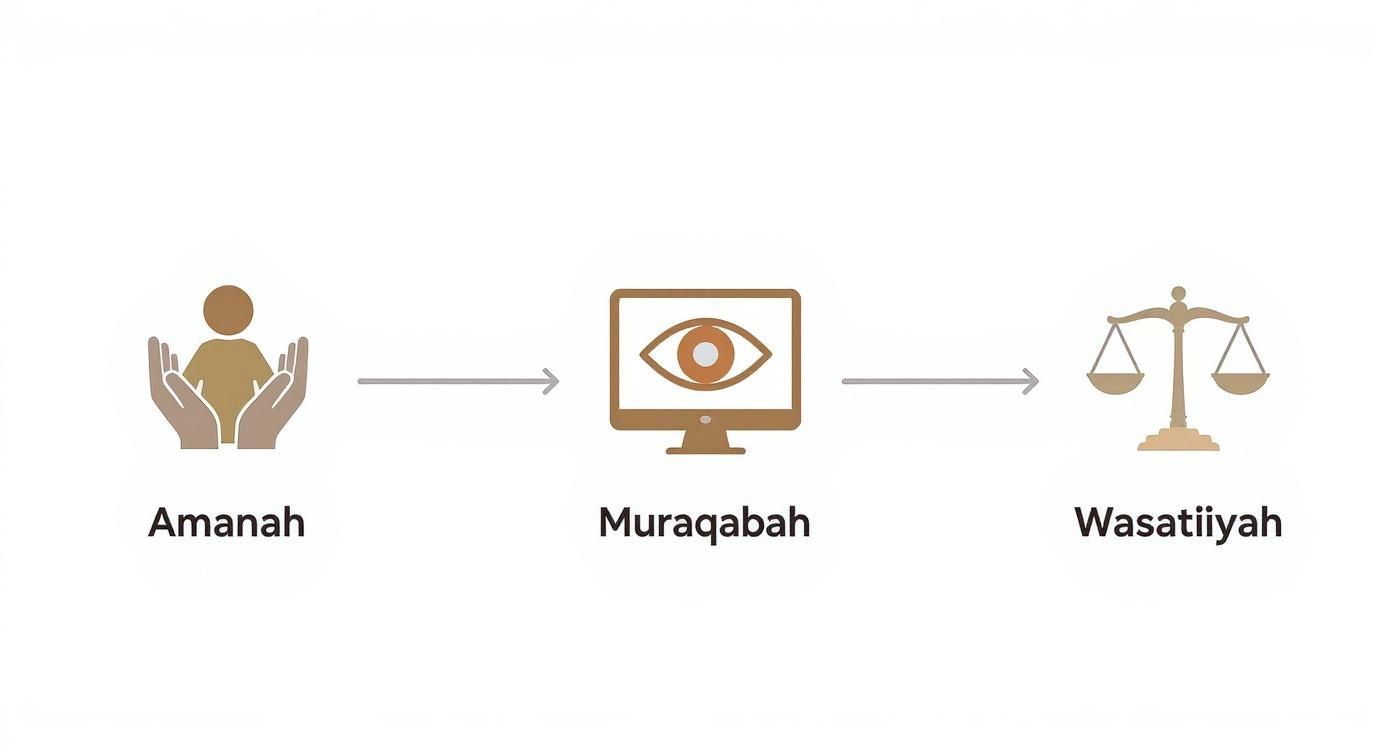
At its heart, this is about fulfilling our trust (Amanah), being mindful of our choices (Muraqabah), and always seeking that beautiful middle path (Wasatiyyah).
Understanding the "Why" Behind Screen Use
Before you hand over a phone or tablet, it’s powerful to take a brief pause and ask yourself, "What is our intention for using this right now?" Your answer can help guide you toward a more purposeful choice. Is the goal...
- Connection? A video chat with family is a wonderful way to nurture relationships and is a truly interactive, valuable use of technology.
- Education? A short video about animals mentioned in the Qur'an or learning the names of the Prophets can be a fantastic learning tool.
- A Moment of Peace? Sometimes, you just need 10 minutes to pray your sunnah without being climbed on or to help an older sibling with homework. A carefully chosen, calm video is a legitimate tool in these moments. There's no need for guilt.
By clarifying your purpose, you shift from reacting with a screen to proactively using it as a tool. It puts you back in the driver's seat, ensuring technology serves your family's values, not the other way around.
Age-Based Screen Time Guidelines for Muslim Families
To make things more concrete, here’s a simple table outlining a gentle, faith-aligned approach for children from birth to age three. Think of these as starting points to be adapted for your own family's unique needs and values.
| Age Group | Recommended Approach | Focus of Content | Real-Life Muslim Home Example |
|---|---|---|---|
| 0–18 Months | Avoid solo screen use. Prioritize live interaction. Video chatting with loved ones is the exception. | N/A (except for video calls). Focus on sensory play, touch, and face-to-face interaction. | Baby "talks" to grandparents on a video call while sitting on Mama's lap. The screen facilitates connection, not replacement. |
| 18–24 Months | Minimal, co-viewed content. If used, watch together for very short periods (15-20 minutes). | High-quality, slow-paced educational content. Islamic nasheeds, simple stories. | Watching a 5-minute video about Wudu together, with a parent pointing and explaining the steps. |
| 2–3 Years | Limited, intentional use. Up to 30 minutes per day of high-quality, pre-approved programming. | Interactive, faith-based learning apps. Shows that model good akhlaq (character). | Toddler uses an Arabic alphabet app for 15 minutes while Dad makes breakfast, followed by putting the tablet away for outdoor play. |
These guidelines help create a predictable structure that supports healthy development while acknowledging the realities of modern life.
Setting Boundaries Without Tears
Building healthy habits from the very beginning makes muslim parenting in the digital age so much smoother down the road. Toddlers are just learning about limits, so your consistency is everything. The good news is that setting these boundaries doesn't have to end in a meltdown every time.
Here are a few gentle but incredibly effective techniques:
- Use Visual Timers: A simple sand timer or a colorful countdown clock on the screen gives your child a concrete way to see time passing. It makes the "all done" moment feel much less abrupt.
- Give Gentle Warnings: A calm, "Five more minutes, and then it's time to say bye-bye to the tablet and read our book!" prepares them for the transition.
- Stick to the Routine: This is your superpower. When children know what to expect because you consistently follow through, they are far more likely to accept the limit without a fight.
Building these small, consistent habits helps your child develop crucial self-regulation skills that will serve them for the rest of their lives, insha'Allah.
How to Choose Halal and Healthy Digital Content
Let's be honest, not all screen time is the same. The real heart of parenting in this digital age is making sure what our little ones see is safe, appropriate, and actually good for them. It’s easy to feel swamped by all the options out there, but you don’t have to be. Think of yourself as a loving curator, hand-picking media that will nurture your child’s pure nature (fitra).
This isn't about some complicated, time-consuming research project. It’s about creating a simple, mindful filter that lines up with your Islamic values and your child's stage of development. Once you have a framework in place, you can build a digital library you feel good about, one that you can trust when you need a few minutes to get things done or finish your Salah.
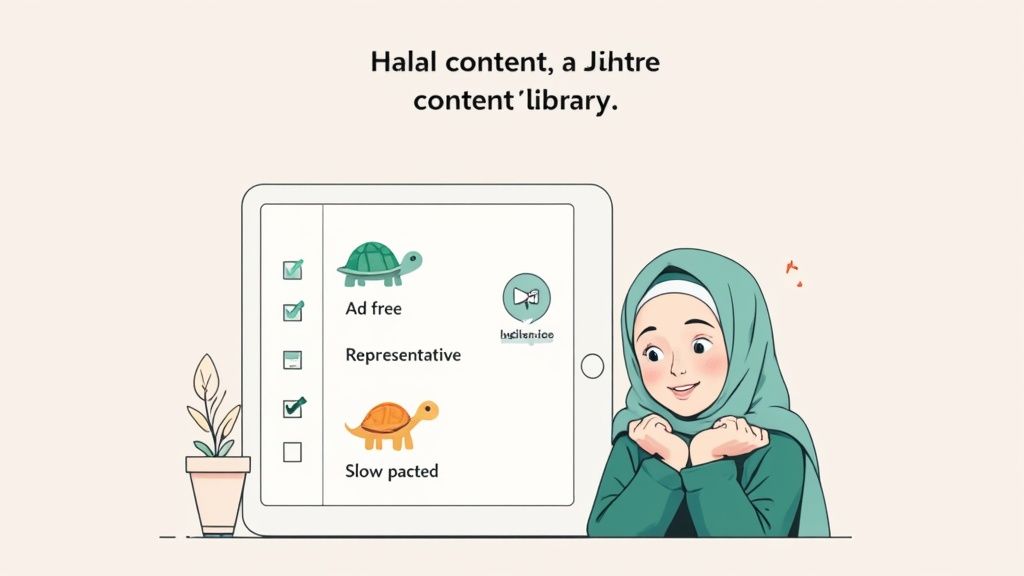
A Simple Halal Content Checklist
When you’re quickly checking out a new app or video, you don't need a PhD in media studies. Just run through a quick mental checklist. Is this a good fit for our family and our faith?
Here are a few simple questions to ask yourself:
- Is it calm and slow-paced? A baby’s brain is still developing and can get easily overwhelmed by fast cuts, loud sounds, and flashy graphics. Look for content with a gentle pace that feels calming, not chaotic.
- Does it promote good adab (manners)? The characters should be modeling kindness, sharing, respecting parents, and other beautiful Islamic manners.
- What about the audio? For many of us, this means choosing content with vocals-only nasheeds or no background music at all.
- Does it show positive representation? Seeing characters who look and live like them helps build a strong, confident Muslim identity from the very beginning.
This simple evaluation helps you make choices with intention. You're not just finding a distraction; you're actively picking content that supports their spiritual and mental growth.
The Power of Representation and Identity
For our children growing up in the West, seeing themselves reflected positively in the media they watch is incredibly powerful. When a cartoon character says "Alhamdulillah" after a sneeze or wears a hijab just like Mama, it validates their identity in a beautiful, natural way.
This kind of reinforcement builds a strong sense of belonging and confidence in who they are as a Muslim. It sends a clear message: your faith and your culture are wonderful and something to be proud of. Seeking out content from Muslim creators is a fantastic way to find these affirming stories.
Choosing media that reflects your child's world is a simple yet profound way to nurture their self-esteem. It tells them, "You are seen, you are valued, and your story matters."
The Peace of Mind of a Safe Digital Environment
One of the biggest worries for any parent is the risk of a random, inappropriate ad or video popping up on a mainstream platform. Their algorithms just weren’t built with our child's fitra in mind. This is where dedicated, ad-free platforms designed for Muslim families really shine.
When you opt for a service that is already curated and halal-focused, you take the guesswork and the worry out of the equation. These platforms are designed from the ground up to be safe digital spaces where every single piece of content has been thoughtfully vetted.
This approach gives you a few key advantages:
* No Inappropriate Ads: You won’t have to lunge for the tablet when an ad for something unsuitable appears.
* No Harmful Autoplay: The platform won't automatically queue up a random, unvetted video when the first one ends.
* A Focus on Values: The entire library is built around promoting Islamic manners, Quranic stories, and learning concepts that you actually want your child to see.
By creating this "walled garden" of trusted content, you can hand your child a device with true peace of mind. For a deeper look into this, you can learn more about finding quality halal entertainment for babies and why it's so important for their development. Building this safe library is one of the most powerful and proactive steps you can take.
Nurturing Connection and Play Beyond the Screen
In our homes, technology should be a quiet assistant, never the main event. A huge part of raising children well in this digital era is finding that sweet spot between what happens on a screen and what happens in real life. This is especially true during those precious, foundational years from birth to age three.
The goal isn't to fear or banish screens. It's about keeping them in their proper place so we can focus on what truly builds a child’s heart and mind: connection with family, hands-on play, and exploring the wonders of Allah’s creation.

From Screen to Real World Activities
One of the most effective ways to practice muslim parenting in the digital age is to deliberately connect something your child sees on a screen to a real, tangible experience. This simple habit turns passive viewing into active learning, reminding them that the most exciting things happen away from the tablet.
Think of it like this: the screen can be the spark, but the real bonfire of learning and fun happens in the world around them.
Here are a few simple ideas to get you started:
- Animal Adventures: After watching a gentle cartoon about farm animals, you could talk about the special animals mentioned in the Qur’an—the camel, the ant, the bee. Make the animal sounds together, or pull out some toy animals and create your own little farm on the living room floor.
- Nature's Colors: If a video was all about colors, step outside. Point to the green of the grass, the blue of the sky, and the vibrant colors of the flowers. You can gently remind your little one that Allah is Al-Musawwir, the Best of Creators.
- Nasheed and Movement: Did you listen to a nasheed about parts of the body? Turn it into a game! "Where is your nose? Where are your hands?" This marries language development with crucial gross motor skills.
Simple, Screen-Free Activities for Healthy Development
The bedrock of early learning isn't built on apps or videos; it’s built through hands-on, sensory play. These are the activities that develop fine motor skills, language, problem-solving, and imagination. And they don't have to be complicated or expensive. Often, the simplest things work best.
The most enriching moments in early childhood are rarely found on a screen. They're in the texture of play-doh, the sound of a story read in a parent's voice, and the joy of stacking blocks until they tumble down.
Try weaving a few of these into your daily rhythm:
- Sensory Play: A simple tray with rice, lentils, or even water and a few cups provides endless fun. All that scooping and pouring is fantastic for building fine motor control.
- Building and Creating: A set of simple wooden blocks or chunky plastic bricks is a powerhouse for encouraging creativity and spatial awareness.
- Islamic Story Time: Cuddle up and listen to an audio recording of a Prophet’s story together or read from a beautifully illustrated Islamic children’s book.
- Helping in the Kitchen: Safely letting your toddler help with simple tasks, like stirring ingredients in a bowl (that isn't hot!) or washing vegetables, builds their confidence and teaches practical skills.
These shared, screen-free moments are where true connection and deep learning happen.
Closing the Gap Between Principles and Practice
It's one thing to know our Islamic principles and another to apply them to our modern, tech-filled lives. If you feel this gap, you are not alone. It’s a common struggle for parents everywhere.
In fact, studies looking into the experiences of Muslim parents show that more than a quarter feel they lack the computer skills needed to fully protect their children from online harms. When you consider the rapid growth of Muslim communities alongside how deeply technology is now woven into family life, it’s clear we need resources that speak to our specific challenges. You can read more about these findings on digital parenting practices to understand the bigger picture.
Closing this gap starts with small, intentional choices. It’s choosing a simple, screen-free activity over automatically turning on a video. It’s taking a moment to connect what your child saw on screen to a real-world object or an Islamic concept. By consciously choosing connection over convenience and play over passivity, you root your parenting firmly in faith and give your child the best possible start.
Creating an Intentional Digital Home Environment
As screens become a fixture in our homes, thinking about our digital environment is just as crucial as baby-proofing the living room. This isn't about walling our families off from technology, but about consciously shaping our home's atmosphere so that screens serve our family’s values, not the other way around. It’s a practical, whole-family approach to making your digital space as safe and nurturing as your physical one.
This process starts with an idea we can call ‘digital muraqabah’—a system of mindful awareness and gentle supervision that protects our children from harm. In day-to-day life, this is simpler than it sounds.
Setting Up a Safe Digital Space
Building this kind of environment is all about making small, consistent choices that add up to a massive impact on your family’s digital habits. You definitely don’t need to be a tech wizard to put these simple safeguards in place.
Start with these foundational steps:
- Keep Devices in Common Areas: Make it a family rule that tablets, phones, and laptops live in shared spaces like the living room. This one habit makes it so much easier to stay aware of what your child is seeing and doing online.
- Use Child-Safe Settings: Nearly every device has built-in parental controls or a "kid mode." It only takes a few minutes to activate these features to filter inappropriate content, shut off in-app purchases, and set time limits.
- Create Screen-Free Zones: Designate certain parts of your home as completely screen-free. Bedrooms and the dinner table are perfect places to start, helping protect sleep and encourage real connection during meals.
Fostering Critical Thinking from the Start
Even with very young children, you can start planting the seeds of critical thinking. This isn't about sitting them down for formal lessons, but about weaving simple conversations into the time you spend with technology together.
For instance, if you co-watch a short Islamic cartoon, you can ask a simple question like, "Wasn't it kind when that character shared their toy?" This helps your toddler connect what they see on the screen to the good manners (adab) you’re teaching them every day.
This mindful approach shifts technology from a passive babysitter into an active tool for tarbiyah (upbringing). You're teaching your child to engage with media thoughtfully, a skill that will become incredibly important as they get older.
Recent research actually backs up this faith-based approach. A comprehensive study on digital parenting through the lens of tarbiyah islamiyah found that systems rooted in Islamic principles can dramatically reduce a child's exposure to harmful content. The study showed that "digital muraqabah" systems reduced exposure to negative content by 68%, while a structured curriculum boosted critical thinking skills. You can read more about the study's findings on digital parenting interventions here.
These strategies give you the tools to manage your family's devices and habits with confidence. The goal is a peaceful, intentional home where technology is used responsibly and supports your child's healthy growth. For parents looking for pre-vetted, safe options to get started, our guide to the best Islamic apps for kids is a fantastic resource for building a trusted digital library. By putting these simple structures in place, you create a home where technology stays in its proper, helpful place.
Answering Your Top Questions About Screens and Faith
As a Muslim parent trying to raise a child in this tech-filled world, you've probably got a lot on your mind. It’s not just about developmental milestones; it’s about nurturing their fitra from day one. Let’s walk through some of the most common questions and concerns that come up.
Is Any Screen Time Really Okay for a Baby Under 2?
It’s true that experts often recommend little to no screen time for children under 18-24 months, and for good reason. But we also live in the real world, where a video call to a faraway grandparent is a precious connection.
The secret isn’t a rigid "all or nothing" rule—it's about context and quality. A five-minute, interactive video call with Jaddah and Jaddoo is worlds away from an hour of a child staring passively at a flashy, fast-paced cartoon.
If you decide to introduce a screen, think of it as a specific tool for a specific purpose. Keep it brief, always watch with them, and choose content that is slow, calm, and educational. The goal is intentionality, not perfect avoidance.
How Do I Find Apps That Are Genuinely Halal and Don't Have Ads?
This is a huge—and completely valid—frustration. You find an app that seems perfect, and then a random, inappropriate ad pops up, and you have to snatch the tablet away. It feels like a constant battle.
Here’s a more practical way to approach it:
* Look for platforms built for us. Start your search with services created by and for Muslim families. They’ve already done the heavy lifting of vetting content so you don't have to.
* Be the first user. Always, always test-drive an app or a channel yourself before you let your child see it. Is it full of distracting ads? Is there instrumental music? Does the content feel right for your family?
* Listen to other parents. Check the app store reviews or ask in your parent groups. Hearing from another Muslim family who has already tried it can save you a lot of time and worry.
What you're looking for are simple, gentle apps that reinforce the good things you're already teaching—kindness, sharing, and remembering Allah.
Help! My Toddler Throws a Fit When I Take the Tablet Away.
First, take a deep breath. This is completely normal toddler behavior. They are just beginning to learn how to handle big feelings like disappointment, and your calm consistency is the key.
The most effective approach is to acknowledge the feeling while holding firm on the limit. You can say, "I know you're sad the show is over, and that's okay," as you gently put the device away.
A little preparation goes a long way. Always give a heads-up before screen time is over—a simple "Five more minutes, and then we'll say bye-bye to the nasheeds" works wonders. Then, immediately shift their attention to a fun offline activity you can do together, like building a tower with blocks or reading their favorite story. With a predictable routine, these meltdowns will become less and less frequent.
Finding a truly safe digital corner for your little one shouldn't add to your mental load. Babymode was created to solve this very problem, offering a curated library of halal, AI-generated content designed to nurture your child's innate goodness (fitra). With zero ads, no manipulative algorithms, and stories rooted in Islamic values, you can finally feel at ease. Join the Babymode waitlist for early access and special launch pricing.
